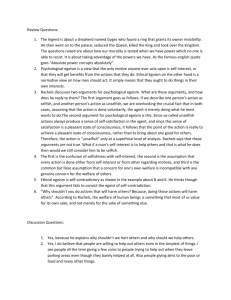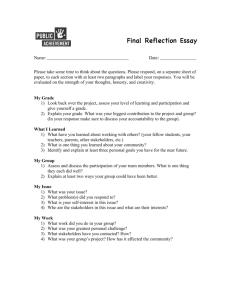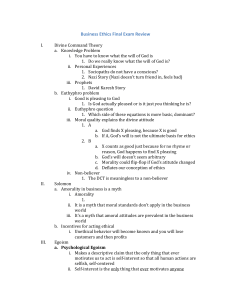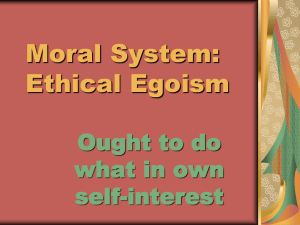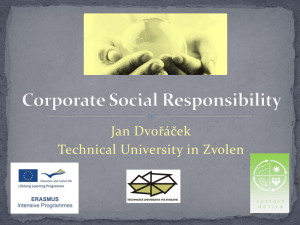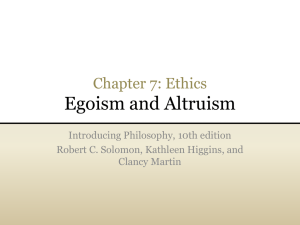Essay RD 2 - Emily's ePortfolio
advertisement
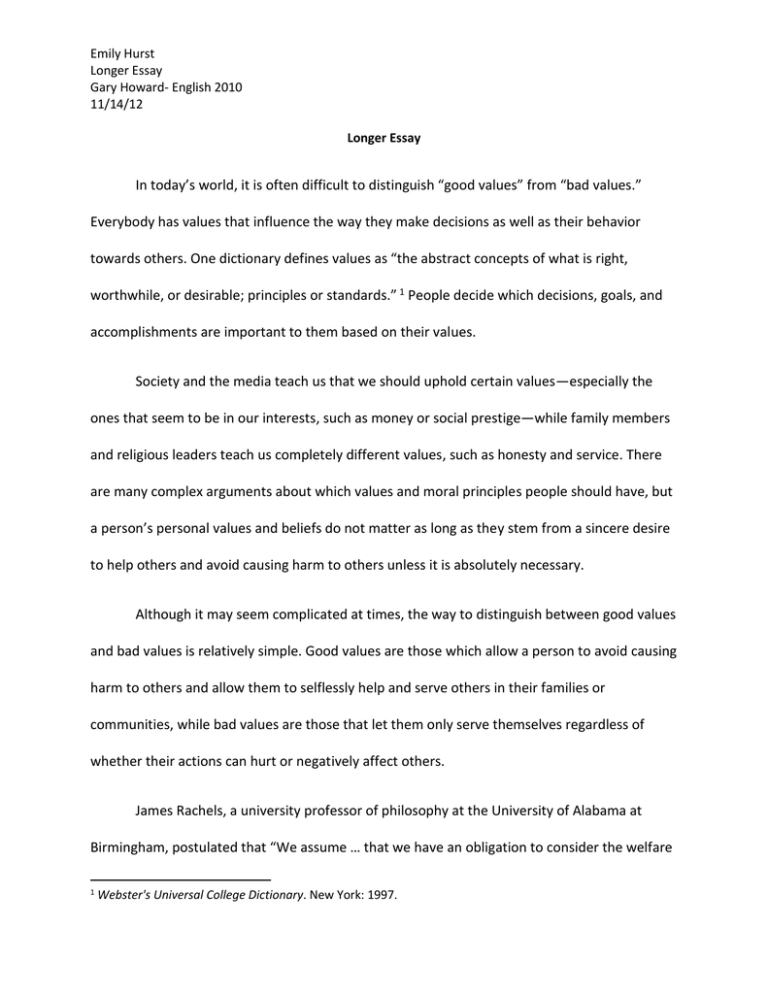
Emily Hurst Longer Essay Gary Howard- English 2010 11/14/12 Longer Essay In today’s world, it is often difficult to distinguish “good values” from “bad values.” Everybody has values that influence the way they make decisions as well as their behavior towards others. One dictionary defines values as “the abstract concepts of what is right, worthwhile, or desirable; principles or standards.” 1 People decide which decisions, goals, and accomplishments are important to them based on their values. Society and the media teach us that we should uphold certain values—especially the ones that seem to be in our interests, such as money or social prestige—while family members and religious leaders teach us completely different values, such as honesty and service. There are many complex arguments about which values and moral principles people should have, but a person’s personal values and beliefs do not matter as long as they stem from a sincere desire to help others and avoid causing harm to others unless it is absolutely necessary. Although it may seem complicated at times, the way to distinguish between good values and bad values is relatively simple. Good values are those which allow a person to avoid causing harm to others and allow them to selflessly help and serve others in their families or communities, while bad values are those that let them only serve themselves regardless of whether their actions can hurt or negatively affect others. James Rachels, a university professor of philosophy at the University of Alabama at Birmingham, postulated that “We assume … that we have an obligation to consider the welfare 1 Webster's Universal College Dictionary. New York: 1997. Emily Hurst Longer Essay Gary Howard- English 2010 11/14/12 of other people when we decide what actions or rules to obey; we think that we must refrain from acting in ways that are harmful to others, and that we must respect their rights and interests as well as our own.” 2 This goes against a popular theory argued by many philosophers, the theory of psychological egoism, which explains that each person looks out for his or her own welfare. Support for this theory is gained from “our frequent observation of selfinterested behavior [and the fact that] altruistic action is often found to be self-interested.3” One value that many people have is the value of money. This is one value that can be used either to serve oneself or to help others. For example, a wealthy person can use his wealth to buy expensive property, clothing, and food, thus only serving himself. On the other hand, a wealthy person may choose to use his money to help the poor and needy. It is not considered morally wrong to be wealthy, but it is considered morally wrong to be selfish, so the wealthy person who shares his money with the poor would be considered “morally right” in his actions. Considering the earlier argument that altruistic action is often found to be selfinterested, one must assume that the wealthy person who shares his money with the poor could be acting in his own interests even though he is helping others. If a person shares his wealth with the poor in order to gain social esteem by showing people what a kind and generous person he is, he is still acting selfishly despite sharing his wealth with others because his main goal is to gain social esteem, rather than the goal of serving others. 2 Rachels, James. "Egoism and Moral Skepticism." Trans. Array Contemporary Moral Problems. James E. White. 9th ed. Belmont: Thomson Wadsworth, 2009. 12. Print. 3 Shaver, Robert, "Egoism", The Stanford Encyclopedia of Philosophy (Winter 2010 Edition), Edward N. Zalta (ed.), URL = <http://plato.stanford.edu/archives/win2010/entries/egoism/>. Emily Hurst Longer Essay Gary Howard- English 2010 11/14/12 Although people often choose to perform actions that appear to be altruistic, that is, their actions help others and provide no benefit to themselves, some philosophers and psychologists hold to the theory of ethical egoism, which states that one ought to choose actions that reflect self-interest, or psychological egoism, which states that a person is only capable of acting in self-interest.4 Many actions that appear to be altruistic initially are later discovered to be actions that were made out of self-interest. Even actions that require a degree of sacrifice on the part of the person carrying out the action can be viewed as filling one’s self interest in some way, even though this may not be apparent from the surface. This can be explained with the concept of reciprocal altruism, which is defined as “an apparently altruistic behavior performed with the understanding that the recipient will reciprocate at some future date.”5 Some people believe that the theory of reciprocal altruism explains why soldiers will throw themselves on a grenade to save others (the soldier’s progeny will reap the benefits of whatever awards they receive posthumously for their act of bravery) and why CEOs of companies build hospital wings (to gain social esteem.)6 Do these aspects of self-interest make 4 Weber, Elijah. "Ethical vs. Psychological Egoism: The Difference and Why It Matters." Everyday Ethics: Ethics for Real People and Real Issues. SEO Article Writing, 31 2009. Web. 7 Nov 2012. 5 "www.everythingbio.com." . N.p.. Web. 7 Nov 2012. <http://www.everythingbio.com/glos/definition.php?word=reciprocal altruism>. 6 Cloud, John. "Competitive Altruism: Being Green in Public." TIME: Science & Space. TIME, 03 2009. Web. 7 Nov 2012. Emily Hurst Longer Essay Gary Howard- English 2010 11/14/12 the action any less moral? Not necessarily. It depends on what value the person performing the action is acting from. The soldier’s action would be considered moral because he acted to save lives and his intention was most likely to save the lives of his companions, not just to win awards after he died. The CEO, on the other hand, while performing an action that is supposed to help others, is doing it in order to gain recognition for himself, so his actions would be considered less moral than those of the soldier. Even though “good values” are generally values that allow one to avoid causing harm to others, there are a few exceptions to this. Self-preservation, for example, sometimes dictates that one must harm another person in order to preserve their own life if the other person is attempting to harm them. For example, if a person is randomly assaulted by another person and they end up killing the assailant in the ensuing struggle, their actions could be justified because they only killed another person in self-defense. This is an example that is a little more extreme, but it demonstrates the principle that there are a few values that are more important than avoiding causing harm to others. In conclusion, the best way to determine whether a value should be considered a “good value” or a “bad value” is to see whether it causes harm to others or helps others. Those that help others are almost always considered good values, but the main factor that determines whether a value is good or bad is the motivation behind it. If a person performs an action that benefits others for the sole purpose of making themselves appear as a better person, their values may be questionable as to whether they are good or bad. If the person performing an Emily Hurst Longer Essay Gary Howard- English 2010 11/14/12 action has a sincere desire to help others through their actions, however, this is a sure sign that the person has good values.
